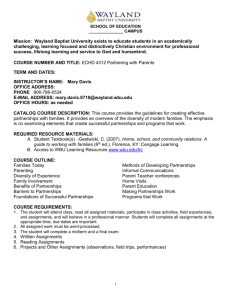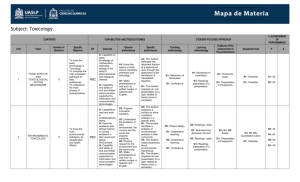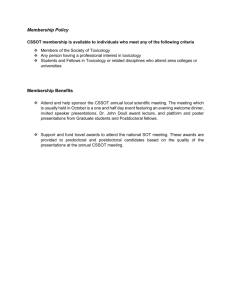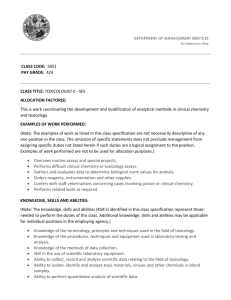PH7293-Environmental Health Toxicology
advertisement
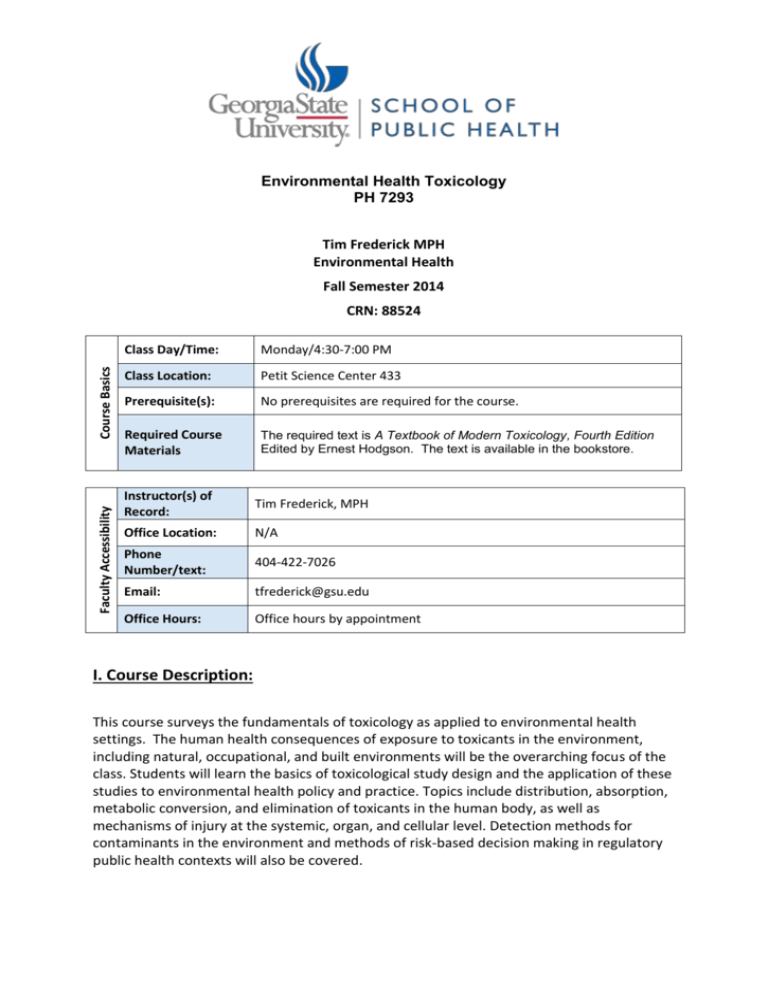
Environmental Health Toxicology PH 7293 Tim Frederick MPH Environmental Health Fall Semester 2014 Faculty Accessibility Course Basics CRN: 88524 Class Day/Time: Monday/4:30-7:00 PM Class Location: Petit Science Center 433 Prerequisite(s): No prerequisites are required for the course. Required Course Materials The required text is A Textbook of Modern Toxicology, Fourth Edition Edited by Ernest Hodgson. The text is available in the bookstore. Instructor(s) of Record: Tim Frederick, MPH Office Location: N/A Phone Number/text: 404-422-7026 Email: tfrederick@gsu.edu Office Hours: Office hours by appointment I. Course Description: This course surveys the fundamentals of toxicology as applied to environmental health settings. The human health consequences of exposure to toxicants in the environment, including natural, occupational, and built environments will be the overarching focus of the class. Students will learn the basics of toxicological study design and the application of these studies to environmental health policy and practice. Topics include distribution, absorption, metabolic conversion, and elimination of toxicants in the human body, as well as mechanisms of injury at the systemic, organ, and cellular level. Detection methods for contaminants in the environment and methods of risk-based decision making in regulatory public health contexts will also be covered. II. Course Objectives / Competency / Assessment of Student Learning: Students in the Master of Public Health program with a concentration in environmental health will be expected to demonstrate competence in the following areas after completion of this course, as indicated in the GSU School of Public Health Graduate Student Handbook (see MPH Competencies): EVHT 1. Demonstrate knowledge of the implications of regulations, laws, standards, and various types of policy on activities aimed at protecting environmental health. EVHT 2. Describe approaches to risk assessment for a wide variety of environmental hazards. EVHT 3. Articulate how biological, chemical and physical agents interact with the environment and affect human health. EVHT 4. Apply biological, chemical, physical and public health principles to development and implementation of prevention and control programs. Course Objective Competency Understand how toxicology is used in human health risk assessment and environmental decision making Demonstrate knowledge of the implications of regulations, laws, standards, and various types of policies on activities aimed at protecting environmental health Describe approaches to risk assessment for a wide variety of environmental hazards Articulate how biological, chemical, and physical agents interact with the environment and affect human health. Articulate how biological, chemical, and physical agents interact with the environment and affect human health. Apply biological, chemical, physical and public health principles to development and implementation of prevention and control programs. Acquire the basic concepts of environmental health toxicology Apply these core concepts to real world environmental health issues Complete a class environmental sampling exercise that will synthesize key concepts and apply to real world settings MPH EVHT Assessment Method(s) Concentration Competency #1 Analytical questions, class discussion #2 Soil sampling lab and class discussion #3 Oral presentation, exams. Class discussion #3 Oral presentation, exams, class discussion #4 Exams, analytical questions, class discussion 2 IV. Course Assignments and Requirements This course assumes substantial and informed student participation. General discussion of theory and practice is encouraged and expected of all students. At a minimum, being informed requires class attendance, completion of assigned readings and homework, and attention to environmental health news and world events. Class attendance and thoughtful participation are important and will be reflected in part in the final grade. Please notify the instructor of an absence before the class via email, text, or telephone. Course requirements will contribute to grade as follows: Course Requirements % of Final Grade Class Participation via classroom discussion and class presentation 5% Analytical Questions 20% Class Sampling Project 10% Class Presentation 15% Mid-Term 25% Final Exam 25% Total 100% Analytical Questions: Students will be periodically assigned to answer analytical questions based on assigned readings. These are intended to be brief writing assignments (no more than 1-2 pages) and will synthesize topics covered in class or assigned readings. Students may need to do additional independent research to fully answer questions. Examinations: Examinations are take home exams that must be completed and submitted by the assigned due dates via Desire2Learn. Other Assignments: The soils lab and class presentations assignment requirements will be discussed in greater detail in class. V. Grading Policy Grading Scale: A = 90-100, B = 80-89, C = 70-79, D = 60-69, F = < 60 Withdrawals: A student who withdrawals at any time up to the mid-point of the quarter will be assigned a W or WF depending upon whether he/she is doing satisfactory work at the time of withdrawal. An average grade of D or F at the time of withdrawal will be assigned a grade of WF. After the mid-point of the quarter, the Registrar’s Office will assign an automatic WF to any student who withdraws from the course without a hardship withdrawal. If a student receives permission to withdraw under hardship, the Instructor will 3 assign a W or WF grade depending upon the student’s work up to the point of time that the student withdrew. The following is the formal policy at Georgia State University: Effective Fall 2001, Instructors must on a date after the mid-point of the course to be set by the Provost (or his designee), 1. give a WF to all those students who are on their rolls but no longer taking the class and 2. report the last day the student attended or turned in an assignment. Students who are withdrawn may petition the department chair for reinstatement into their classes. The midpoint for this academic semester is October 14. Incompletes: A student will be given the grade I only if nonacademic circumstances beyond the student’s control prevent the student from completing a small segment of the course— e.g., the final examination. For a student to receive the grade of I, he/she must be doing satisfactory work (an average grade of C or better) up to the point that he/she could not continue. Arrangements must be made with Instructor to remove the incomplete grade within one quarter. VI. Attendance Policy Attendance and participation are expected and are integral to the course. Active and informed participation is part of the grade of this course. VII. Late Assignments and Make-up Examination Policy Please upload all assignments into Desire2Learn. Include your last name in the name of the file. Please do not wait until the last minute to submit assignments in case you run into technical problems. Assignments will NOT be accepted via email. Any assignment turned in late may have points deducted up to one letter grade for each day the assignment is late. Make-up exams are not provided, except in hardship cases that should be discussed in advance with the Instructor. There is no scheduled make-up time for exams or paper presentations. If a student cannot take an exam or present at the scheduled time, they must consult with the Instructor on scheduling the make-up. VIII. Syllabus Deviation Policy The course syllabus and schedule of topics provide a general plan for the course; deviations may be necessary. Additional or substitute reading materials may be required and made available to students via handout or other means. In addition, as noted in the “Course Requirements” section above, students are expected to independently access and be familiar with environmental health issues and topics as presented in various media. IX. Policy on Academic Honesty 4 All students at this University are expected to engage in academic pursuits on their own with complete honesty and integrity. Any student found guilty of dishonesty in any phase of academic work will be subject to disciplinary action. The complete Academic Honesty policy is located in the GSU Graduate Catalog, Section 1350: http://enrollment.gsu.edu/catalogs/. Students and faculty are expected to review and conform to the university’s policy on academic honesty. http://codeofconduct.gsu.edu/. Special attention should be paid to the sections on plagiarism and multiple submissions: Plagiarism. Plagiarism is defined as, “appropriating and putting forth as one’s own the ideas, language, or designs of another” (The Living Webster, 1975) – and it is strictly forbidden. Written and oral presentations must be a student’s own work. Students plagiarizing or cheating in any form will face disciplinary action which could result in an “F” in this course and suspension or expulsion from the University. Copying from written materials, presentations, websites, etc. without source acknowledgement and referencing is plagiarism. Read it, appreciate it, learn from it, and make sure you source it – and then reflect it with your own thoughts and words! If you are uncertain about what constitutes plagiarism, please contact the instructor. Multiple Submissions. It is a violation of academic honesty to submit substantial portions of the same work for credit more than once without the explicit consent of the faculty member(s) to whom the material is submitted for additional credit. In cases in which there is a natural development of research or knowledge in a sequence of courses, use of prior work may be desirable, even required; however, the student is responsible for indicating in writing, as a part of such use, that the current work submitted for credit is cumulative in nature. XI. Disability Accommodations Policy Students who wish to request accommodation for a disability may do so by registering with the GSU Office of Disability Services. Students may only be accommodated upon issuance by the Office of Disability Services of a signed Accommodation Plan and are responsible for providing a copy of that plan to instructors of all classes in which an accommodation is sought. The Office of Disability Services is located in the GSU Student Center, Suite 230. XII. Course Evaluations Statement Your constructive assessment of this course plays an indispensable role in shaping education at Georgia State. Upon completing this course, please take time to fill out the online course evaluation XIII. Career Services 5 The School of Public Health provides career services & student leadership opportunities (student clubs & organizations) to all current SPH students and alumni. SPH Career Services can help students with resume writing, interviewing, job searching, internship development, and professional networking. Students are invited to attend our career events and workshops, and individualized career counseling appointments can be arranged. To see what career panels, career fairs, and events are available this semester, please visit: http://publichealth.gsu.edu/students/career-resources/. The SPH Career Services office is co-located with the Office of Academic Assistance in room 640 at One Park Place. XIII. Additional Policies and Statements Communication Students should check Desire2Learn at least every other day especially before driving or riding to GSU for this class. The syllabus, any changes to the syllabus, lecture slides and homework will be posted to Desire2Learn. Should you have any questions about the course or its requirements, please ask your question during class or contact the Instructor via Desire2Learn. Students also may make an appointment to meet with the Instructor on class concerns. Should you wish to contact the Instructor about your grades, please address them in writing or in person to the Instructor. Please do not use e-mail to communicate about grade concerns. Syllabus The course syllabus and schedule of topics provide a general plan for the course; deviations may be necessary. Additional or substitute reading materials may be required and made available to students via handout or other means. In addition, as noted in the “Course Requirements” section above, students are expected to independently access and be familiar with health care issues and topics as presented in various media. Copyright Policy “For the purpose of copyright, students must adhere to the following rules: 1) Materials in the course reserves may only be accessed by a passcode or password by students enrolled in that course, and only for the semester of course enrollment 2) Students may not distribute copies of course reserves materials to other students Grade Point Average Requirements An overall grade point average (GPA) of 3.0 or better must be earned to receive the MPH degree. All core courses must be completed with a grade of B or better, and no more than six semester hours of grades less than B will be accepted for the degree. No grade below a C will be accepted toward the degree. Please refer to the Institute’s academic standing policy on Academic Warning and Suspension described in the School of Public Health section of the Graduate Catalog: http://www2.gsu.edu/~catalogs/2012-2013/graduate/ Important Websites 6 The following resources may be useful: EPA, Integrated Risk Information System (IRIS), toxicity information for common environmental contaminants: http://epa.gov/iris EPA, ACToR Toxicity Database: http://www.epa.gov/actor/ CDC, Agency for Toxic Substances and Disease Registry (ATSDR), Toxicological Profiles: http://www.atsdr.cdc.gov/toxprofiles/index.asp NIH, TOXNET Toxicology Data Network: http://toxnet.nlm.nih.gov/ Society of Toxicology: http://www.toxicology.org/ Toxicology Excellence for Risk Assessment, International Toxicity Estimates for Risk Assessment: http://www.tera.org/iter/ Course schedule, topics, and readings: Note: In addition to the reading assigned below, additional readings on topical subjects will be assigned over the course of the semester. August 25th Topic(s): Overview of Course, Introductions, Basic Toxicological Concepts Text: Hodgson, Chapters 1, 3, 4 September 1 – Labor Day, No Class September 8th Topic(s): Toxicity Testing Readings: Hodgson, Chapters 2 & 20 September 15th Topic(s): Toxicant Absorption and Distribution Readings: Hodgson, Chapters 5 and 6 September 22nd Topic(s): Toxicant Metabolism, Elimination, & Acute Toxicity Readings: Hodgson, Chapters 7-10 September 29th Topic(s): Catch-up & work time (class will not meet) Watch: The Poisoner’s Handbook: http://www.pbs.org/wgbh/americanexperience/films/poisoners/ October 6th Topic(s): Hepatotoxicity and Nephrotoxicity Readings: Hodgson, Chapters 11 and 12 7 October 13th Topic(s): Endocrine Toxicology and Respiratory Toxicology Readings: Hodgson, Chapters 17 & 18 Midterm Posted October 20th Topic(s): Carcinogens, Mutagens, and Teratogens Readings: Hodgson, Chapters 11 & 12 Midterm Due October 27th Topic(s): Identifying Toxicants in the Environment & the Fate and Transport of Environmental Contaminants Readings: Hodgson, Chapters 24 & 26 Nov 3rd Topic(s): Regulatory Toxicology & Risk Assessment Readings: Hodgson, Chapters 22 and 23 Nov 17th Topic(s): Soil Lab and Applied Risk Assessment Nov 24th Thanksgiving Break – No School Dec 3rd Topic(s): Advanced Risk Assessment Topics & Communicating Risks of Environmental Toxicants Readings: Hodgson, Chapters 28 and 29 Dec 8th Topic(s): Class Presentations Final Posted Dec 15th Scheduled Final Exam Date – Final Due in D2L 7PM 8
